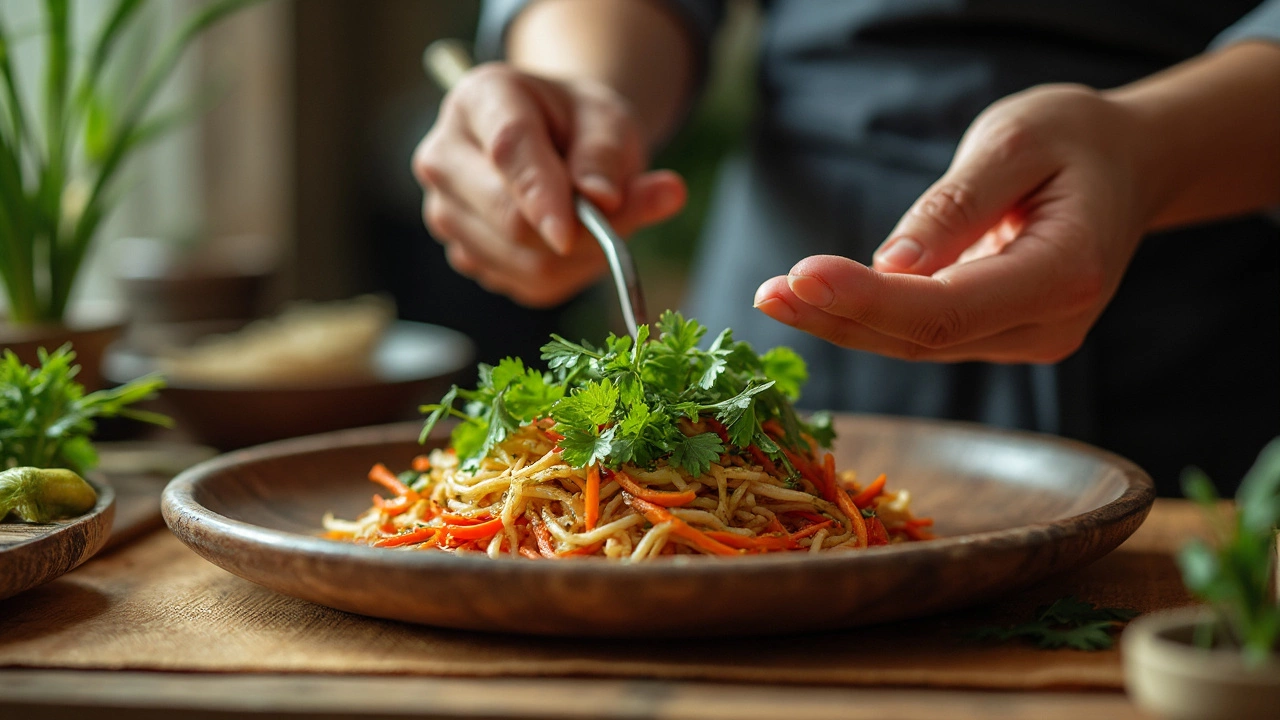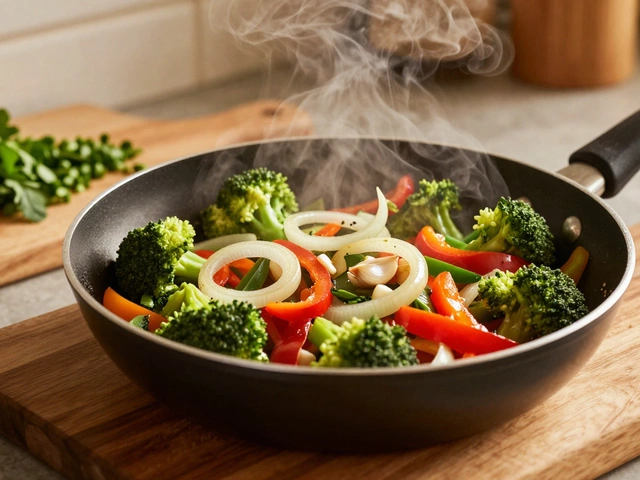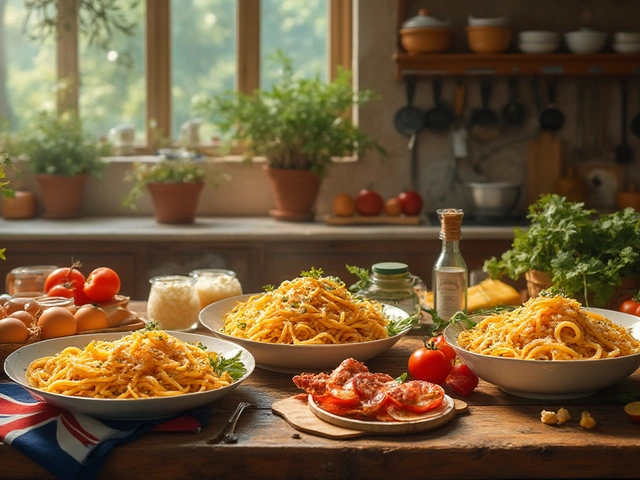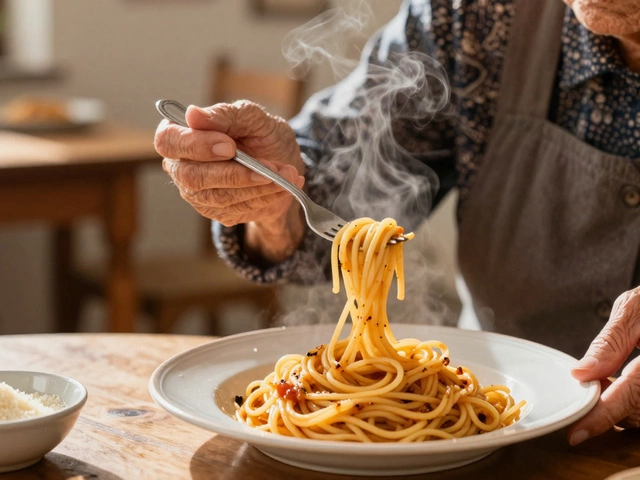
Ever wondered which cultures mostly stick to a vegetarian diet? It's not just a modern trend but something that's deeply rooted in the traditions of many countries. Some places have been all about plants long before it became popular to do so in other parts of the world. Take India, for example. It's a place where you'll find the largest portion of the population practicing vegetarianism, thanks to centuries-old religious beliefs and a rich variety of regional produce. But it's not just the spices that make Indian vegetarian food a feast for the senses—it's the cultural significance behind it all.
Heading east, several Asian countries also have strong vegetarian traditions. In places like China and Japan, there's a big focus on veggies, tofu, and legumes. Buddhist practices play a big role, encouraging a meat-free lifestyle that's reflected in many traditional meals. Lots of these dishes are bursting with flavor and nutrients, providing a different take on plant-based eating compared to Western styles.
- India: The Vegetarian Haven
- Vegetarian Traditions in Asia
- The Mediterranean Approach
- Incorporating Plant-Based Meals at Home
India: The Vegetarian Haven
India is pretty much at the top of the list when it comes to vegetarian cultures. It's estimated that around 20-40% of Indians follow a vegetarian diet. That's like millions of people living the veg life every single day! The reason behind this isn't just the abundance of vegetables and spices available but also the influence of religions like Hinduism, Jainism, and Buddhism.
In Hinduism, a large chunk of adherents prefer a vegetarian diet due to principles like non-violence and respect for all living beings. Jainism takes it a step further, advocating for a stricter form of vegetarianism that excludes root vegetables to avoid harming tiny creatures in the soil. These deep-rooted beliefs have shaped a kitchen that's both ethical and tasty.
Indian cuisine varies massively from north to south and east to west. Each region has its own twist on vegetarian dishes. In the north, you’ve got hearty meals like paneer butter masala and aloo gobi gracing the dining table. Head to the south, and it’s all about dosas, sambar, and coconut-rich curries. Not to mention, Indian street food like chaat or samosas is a vegetarian's happy place!
Its popularity isn't just an Indian thing anymore. The use of spices like turmeric, cumin, and coriander not only jazzes up veggies but also brings a bunch of health benefits. Who doesn't love the idea of eating food that tastes great and is good for you?
So, if you’re looking to jump on the vegetarian bandwagon, diving into Indian recipes might be your best bet. From protein-rich lentil dals to spicy chickpea curries, there's plenty to keep your taste buds excited without missing meat. Plus, most meals are surprisingly easy to whip together at home. All these options often make people wonder why they'd ever eat anything else.
Vegetarian Traditions in Asia
When thinking about vegetarian-friendly cultures, Asia is a goldmine of plant-based cultural cuisine. Some countries have deep-rooted traditions for avoiding meat, often due to religious practices like Buddhism and Taoism. These beliefs emphasize non-violence and compassion for all living things, making vegetarian and vegan lifestyles a natural choice.
In China, vegetarianism has been popular among Buddhist monks for centuries. They use a lot of tofu, seitan, and a huge array of vegetables to create dishes that are both filling and tasty. You might have heard of Buddha’s Delight, a classic Chinese vegetarian dish that beautifully blends flavors and textures using a wide range of veggies and tofu.
Meanwhile, Japan offers a different take on the idea. Known for their minimalist approach to food, Japanese vegetarian dishes often highlight seasonal ingredients. A great example is Shojin Ryori, a style of cooking developed in Zen Buddhist monasteries. It reflects the principles of simplicity and balance, typically using ingredients like tofu, seaweed, and fresh local vegetables.
In Korea, traditional temple cuisine, known as balwoo gongyang, is another reflection of the Buddhist influence. It’s all about celebrating natural ingredients, often grown locally and organically. Meals usually consist of a variety of side dishes known as banchan, which include fermented veggies, beans, and grains.
Here’s a fun table with some popular vegetarian dishes from these cultures:
| Country | Dish |
|---|---|
| China | Buddha’s Delight |
| Japan | Shojin Ryori |
| Korea | Balwoo Gongyang |
Asia’s vegetarian options aren’t just about the absence of meat; they’re a celebration of diverse grains, legumes, mushrooms, and leafy greens. Each dish tells a story and offers something fresh to our plant-based diets, whether you’re a long-time veggie lover or just experimenting with vegetarian recipes.

The Mediterranean Approach
The Mediterranean diet often gets a lot of love for being one of the healthiest out there, and it's super friendly for vegetarians too. This diet emphasizes fresh fruits, veggies, whole grains, and healthy fats like olive oil. It’s not just about what's on the plate but how meals are enjoyed—shared with family and at a leisurely pace. That's the real Mediterranean feel.
One standout aspect of this region's eating habits is the emphasis on local and seasonal produce. Things like tomatoes, eggplants, zucchinis, and chickpeas feature heavily. Dishes like ratatouille, lentil soup, and fresh salads with a drizzle of olive oil are staples. Cheese and yogurt also play a role but in moderation.
Let's not forget the legacy of sustainable eating. According to a study published by the European Journal of Clinical Nutrition, "The Mediterranean diet is not only associated with a lower incidence of heart disease but also contributes significantly to environmental sustainability." This adds a whole new layer of goodness to considering a Mediterranean, mostly vegetarian approach.
Why not try incorporating some Mediterranean dishes into your meals at home? Here's a simple idea:
- Get some fresh tomatoes and cucumbers, chop them up, and toss them with feta cheese and olives.
- Add a splash of olive oil and a squirt of lemon juice to enhance the flavors.
- Season with a sprinkle of oregano and season to taste with salt and pepper.
Give it a try and enjoy a little piece of the Mediterranean on your plate!
Incorporating Plant-Based Meals at Home
Getting started with vegetarian recipes at home isn't as tricky as it might seem. You don't need to overhaul your kitchen or throw out your family favorites. Instead, think of it as adding more colorful and nutritious options to your plate. It helps to start with dishes you're already comfortable with and swap out the meat for plant-based alternatives. For instance, think about making a hearty vegetable stir-fry or a classic pasta dish with plenty of greens and herbs.
One handy tip is to stock up on versatile ingredients like lentils, chickpeas, and beans. They're high in protein and can freakishly change the texture of dishes, making them feel just as satisfying as meat. They're easy to find and super budget-friendly. Throw some into salads, soups, or even your trusty taco night lineup.
- Check out flavored spices and sauces: These can jazz up veggies and legumes in no time. Think of adding soy sauce, curry powder, or smoked paprika.
- Try new recipes on weekends: This gives you time to experiment and find out what you really like.
- Meal prep: Cook in batches so you don't end up in a time crunch during the week. This also stops those last-minute takeout urges.
It might surprise you to learn that once you step into the diverse world of plant-based diets, your taste buds will discover flavors that go beyond just veggies. Countries with a strong vegetarian culture, like those in the Mediterranean, often find creative ways to turn simple ingredients into mouthwatering dishes. Think of roasted vegetable and chickpea salads drizzled with olive oil or traditional Japanese miso soup, loaded with tofu and seaweed. Vegetarian cultures have become masters at using plants to create hearty meals that don't compromise on taste.
Here's something interesting: a recent survey showed that 42% of people who started a vegetarian diet did so primarily because of the health benefits they found. People report feeling more energetic, less bloated, and even sleeping better. It’s amazing how a switch in diet can make such a difference!
Remember, the goal isn't to be perfect. It's about finding what works for you and making small changes that add up to healthier lifestyle choices. Who knows, maybe in a little while, you'll be whipping up your go-to vegetarian recipes without even thinking about it!





